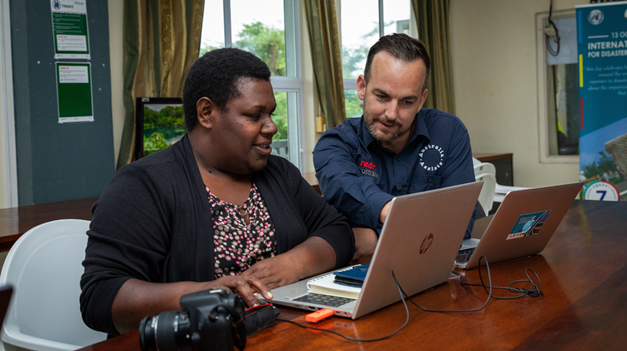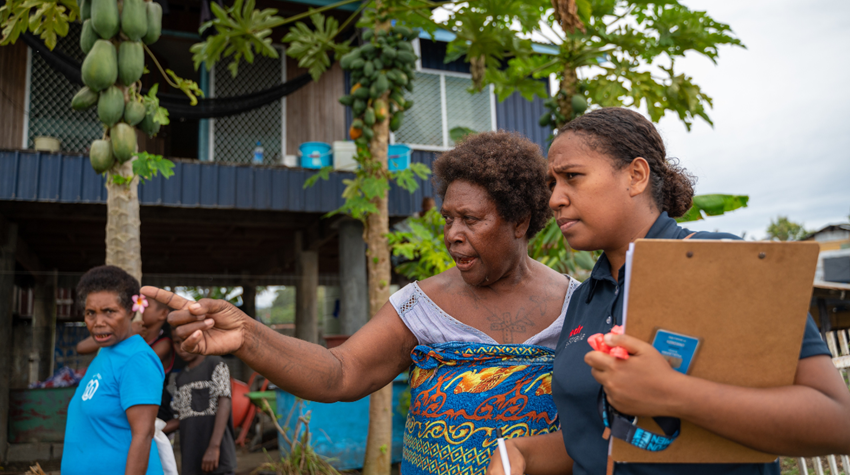People living in Pacific countries are at heightened risk of natural hazards and have become very resilient. However, different groups of people experience disasters differently, and inequality in any community can increase exposure and vulnerability to disasters. Women, men, children, those with a disability and other minorities will have different needs when it comes to disaster response and reducing risk.
Mark, Everlyn and Georgina are three Australia Assists Program deployees who have supported Pacific partners in their disaster risk reduction efforts. The Australia Assists Program is the Australian Government’s Humanitarian deployment program, and is part of Australia’s commitment to supporting partners in the region.
Gathering timely information saves lives
 Australia Assists Program deployee Mark, pictured with Bronwyn Olul, Disaster Communications Manager, supported the Government of Vanuatu’s coordination and information management efforts during this year’s cyclone response.
Australia Assists Program deployee Mark, pictured with Bronwyn Olul, Disaster Communications Manager, supported the Government of Vanuatu’s coordination and information management efforts during this year’s cyclone response.
In March this year, Vanuatu was struck by two category three cyclones in three days. Mark was deployed through the Australia Assists Program to Vanuatu’s National Disaster Management Office (NDMO) to support the government in their coordinated response to the effects of those cyclones. “When a disaster strikes, there are really common needs around food, water, shelter, safety and security,” says Mark. “The job of the National Disaster Management Office here in Vanuatu is to coordinate all of the actors to ensure that the needs of the population are met.”
“My role was to support in filling gaps,” says Mark. “The first thing I did when I arrived was ask how I can help.” Based on the NDMO’s need for coordination and information management support, Mark very quickly slotted into a role assisting the government’s coordination with the UN’s Office for the Coordination of Humanitarian Affairs (OCHA) and other international actors. He helped to manage and organise the information that was coming in, evidencing the impact of the cyclones, and collating it to inform response activities.
Information management and coordination are key roles in humanitarian response, making sure efforts are not duplicated and that communities in most need are supported. Crucially, having data means that vulnerable populations can be specifically offered assistance. “It supports decision making through collating information assessment data, making plans around targeting the most affected populations and ensuring that vulnerable people - such as elderly people, people with disability, women, children - have their needs met first.” Mark explains.
Identifying people who are most vulnerable to the effects of a disaster, planning for their needs and building their preparedness underpins a community’s resilience, and promotes equality. “People in Vanuatu are incredibly resilient. They are well experienced in disasters, and as a result of work being done by the National Disaster Management Office, with the support of the Australia Assists Program deployees, they are increasingly prepared, both to mitigate the risks and also to recover quickly.”
Different groups have different needs in a disaster
Australia Assists Program deployee Everlyn, is from the Solomon Islands and was deployed to UN Women in her home country as their National Gender and Resilience Officer. Working on the Women’s Resilience to Disasters program, Everlyn assisted in training Solomon Islands communities to better respond to disasters and help save lives. Her work ensured the inclusion of all genders, ages and abilities.
“It is important that disaster risk reduction is gender responsive because disaster affects different gender groups differently,” says Everlyn. “If our risk reduction programs are not targeted to each gender, we will continue to leave the most vulnerable in the population behind.”
“What motivated me is seeing a lot of women and girls becoming casualties or even losing their lives during past disasters, like the tsunami in Temotu province in 2013 and the 2014 river flooding in our capital Honiara. Most of the casualties were women. Of the 22 people who died in the flooding, 21 were women and girls. So, I have the heart and the motivation to see how I can help women and girls to be more prepared in the future.”
One example of the differences the genders face is access to early warning messages from the meteorological services and from the National Disaster Management Office. Women from rural areas have lower literacy rates, so may not understand the messages and therefore may not prepare in time for an identified disaster. Everlyn works to apply a gender lens to Disaster Risk Reduction mechanism, to make sure they take into consideration issues affecting women and girls. This includes also recognising that these women are also agents of change and we must reflect on their existing traditional knowledge, skills and strength as leaders in their communities.
“We want to work better with women at the community level so they can be involved in disaster risk management,” says Everlyn. “We've already trained 27 organizations to train other women at the community level and to link traditional disaster risk management organizations with gender equality organizations, so they can understand better how to integrate women and girls as well as people with disabilities into planning and decision making.”
Reflecting on her work with UN Women, and the future of her country, Everlyn says “I hope in the future the women of Solomon Islands are better informed on early warning messages and meaningfully understand that information and be able to prepare for disasters and to ensure that their livelihoods are safe. When flooding comes, they will know what to do, they will know their food supplies are in stock and ready for disasters, they will know how they can respond and care for the children in the community and the elderly. During disasters, they will not panic.”
Strengthening gender responsiveness at the local level
Georgina is currently deployed through the Australia Assists program to the Fiji Council of Social Services as their Disaster Risk Reduction (DRR) Advisor. She is working with local organisations based in the west of the country, who have received fewer training and development opportunities in the past.
“The reach of this deployment goes directly into the villages and communities,” says Georgina. “Being based in the west is already a positive step to reaching areas that do not usually receive training. The training that I am engaged in will be rolled out at the grass roots of Fijian society. These are the people who are directly impacted by disaster and crisis and who will be aware of both their safeguarding responsibilities and the responsibilities of humanitarian actors coming into their villages and towns.”
A significant achievement of Georgina’s deployment has been to activate a DRR network in Fiji’s west, made up of elected focal points from each district. She is also piloting a “Women in DRR in the West” group at the hyperlocal level, and connecting members to larger, regional level organisations. “In consultations I have held so far I have ensured a place for women to talk, and this has meant being aware of village gender dynamics and how to navigate them,” says Georgina. This time outside of the cyclone season gives local organisations time to plan, coordinate and reflect on priorities for the season ahead.
Georgina has secured funding to roll out a Safeguarding and PSEA training to all of the district groups. Offering this training to all of the district groups recognises the frontline role they play when disasters strike, and they are mobilised to be first responders.
A Draft Gender and Social Inclusion Policy will be circulated for feedback from district groups at the same time the training is held, as equality is a priority for the organisation. “Gender parity was raised at the FCOSS Annual General Meeting this year,” says Georgina, “and FCOSS have made changes to their Executive to ensure a 50/50 Gender balance.” Importantly, Georgina will be travelling with an FCOSS staff member to deliver the training, building the training capacity of her colleague and supporting the transfer of skills.


